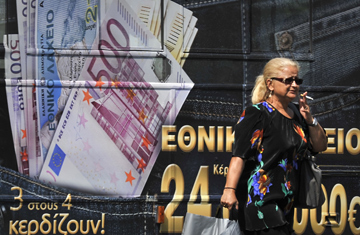
A woman walks by an advertisment of the national lottery in Athens on Sept. 19, 2011
Doom is once again stalking the euro. Debt-addled Greece is teetering on the edge of default as it holds tense talks with the International Monetary Fund and European authorities over getting more bailout money. Standard & Poor's credit-rating agency cut Italy's sovereign debt rating by one notch on Tuesday, from A+ to A, despite the vote last week in Italy's Parliament to slash spending by €45 billion ($62 billion). And after a brief upturn this spring, growth in the 17-member euro zone is now expected to reach a "virtual standstill" by the end of the year, according to European Commission forecasts. All this is playing out as febrile global markets tumble in the growing expectation that the euro — still the world's second reserve currency after the dollar — could shatter. Is there any way to hold the euro zone together?
World leaders have weighed in on the euro-zone crisis, suggesting radical solutions. U.S. Treasury Secretary Tim Geithner — who joined European Union finance ministers at a special meeting in Poland last weekend — called for "overwhelming force" to protect the euro. Chinese Prime Minister Wen Jiabao has pledged financial support. Even Russia has raised concerns, with Finance Minister Alexei Kudrin calling on the E.U. to act decisively to keep the crisis from spreading.
In their public statements, German Chancellor Angela Merkel and French President Nicolas Sarkozy have vowed to prevent the euro zone from breaking up, but they still seem reluctant to take decisive action. Indeed, Germany is increasingly hostile to the idea: politicians have broken the taboo on mentioning a possible collapse of the euro zone as they talk loudly of ejecting Greece from the single currency. Finland, Austria and the Netherlands are all demanding concessions from Greece before signing off on the €109 billion ($157 billion) package of low-cost loans agreed to at a euro-zone summit in July. Dutch Prime Minister Mark Rutte has even proposed that highly indebted states be put into "guardianship," with spending decisions seized from the elected government and placed under the direct control of an E.U. commissioner.
The frosty political mood reflects popular skepticism about the benefits of the monetary union and increased voter fatigue about helping other countries when the economic going gets tough at home. That lack of trust has inevitably spread to markets, unconvinced as they are that the euro zone has the political and financial means or will to bail out Greece, let alone other troubled economies like Portugal, Italy and Spain. And despite countless summits and grandiose promises to plug the gaps, European leaders have failed to turn the situation around. Greece's debt-to-GDP ratio has actually risen since the bailout agreed to in May 2010: its debt mountain has grown, and its economy is forecast to shrink between 5% and 7% this year.
A key factor is the political paralysis across Europe. In a policy note last week, the Royal Bank of Scotland said the euro zone faced "a coordination failure of unprecedented scale" and chastised "two years of failed crisis management, let alone prevention," as it warned that the cost of stabilizing the single currency had risen rapidly to a level that might now require the U.S. and Asia to step in.
In Brussels, the European Commission last week tried to offer a radical solution. Describing the crisis as "the most serious challenge of a generation," Commission President José Manuel Barroso proposed the creation of a common euro bond jointly underwritten by all 17 countries in the bloc to help slash borrowing costs. But an earlier ruling by Germany's Constitutional Court said any such move to fiscal union would have to be sanctioned democratically — a risky proposition in Europe's current climate of mutual recrimination.
Earlier this month, Merkel delivered a staunch defense of the euro in the Bundestag, saying it "cannot be allowed to fail and will not fail." U.S. President Barack Obama last week urged the E.U. to deal with the crisis: "In the end, the big countries in Europe, the leaders in Europe, must meet and take a decision on how to coordinate monetary integration with more effective, coordinated fiscal policy."
But these assertions sit uneasily with the events of the past two years, according to Simon Tilford, chief economist at the London-based think tank the Center for European Reform, who warns that a fracturing of the euro zone is almost inevitable judging by current political trends. "Otherwise rational people talk about something 'coming up' or express confidence that policymakers 'will never let that happen,' " he says. "The euro crisis has spun out of control because euro-zone governments are unwilling to acknowledge that their policies have an impact on other member states and that this requires a measure of solidarity."
And at the moment, solidarity is hard to find. Unless Europe can locate it soon, the euro zone seems headed for an unseemly breakup.
